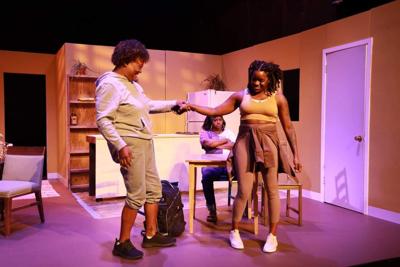This past Sunday, Bayou Road was bustling. Saints fans lined the sidewalk in front of the upscale cigar bar Whiskey and Sticks, while others crowded the Velveteen Lounge, a worker-owned cafe and bar.
A few folks milled around the small outdoor market-style booths at the King and Queen Emporium, and at Ethiopian restaurant Addis NOLA the dinner crowd was drifting in.
Inside the André Cailloux Center, a performing arts venue in the renovated former St. Rose de Lima church, it was opening weekend for “Back in the Day,” a new play from New Orleans playwright Harold Ellis Clark, produced by the center’s resident theater company, No Dream Deferred. Theatergoers mixed and mingled around the lobby’s Sanctuary Bar beneath a banner that declared “Unapologetic Black Theatre.”
A busy year
It’s been a busy year for No Dream Deferred. This spring, the company put on its inaugural We Will Dream Festival, a new play festival highlighting the work of Black artists that featured four shows running in repertory March through June.
That mission continues with “Back in the Day,” a domestic drama that shines a light on some of the dark corners of communities where victims of violence are often expected to keep quiet and left to process trauma and grief alone.
Directed by Lauren Turner Hines, artistic director at No Dream Deferred, Clark’s play is a well-constructed work that unfolds scene by scene, never flinching in its stark but compassionate portrayal of the generational harm inflicted by sexual violence and its aftermath.
The play is set in 2019, in the mixed-income residential development in Algiers that was once the Fischer public housing development, where Corrine returns home to her adult daughter Nadhira after a long stint in prison.
We soon learn that Corrine’s crime was a violent one, perpetrated against one of the men who raped and brutalized Nadhira’s childhood friend and current running partner Rhonda.
The assaults left all three women scarred, along with Bobbie, Rhonda’s mother, an ex-addict who was unwilling or unable to speak up for Corinne at the time of the crimes, perpetuating a silence that left old wounds open and festering.
Strong ensemble
The ensemble cast is uniformly strong, anchored by the commanding physical and emotional presence of Delphine J. as Corrine. The younger girls, Riga Ruby as Nadhira and April Louise as Rhonda, have a strong chemistry as longtime friends and hustling entrepreneurs, both high-strung and quick to butt heads, even with each other.
Karen Kaia Livers, as Bobbie, adds an even-keeled element to the charged narrative, as the former junkie who managed to kick her addictions and now works as a teacher when she’s not meditating at the beach — though her past is harder to escape with Corrine’s return.
The narrative is tied together with a feature role by Martin Bradford, who excels in his portrayal of an ex-athlete turned college football coach, making high-profile media appearances decked out in dark shades and expensive jewelry.
Clark’s script has a sharp knack for real-life dialogue, though audiences should know that the play includes strong language and vivid depictions of sexual violence. Under Turner’s direction, the difficult content maintains a striking rawness but is handled with care, as we see a softer side of the characters’ hard times.
“I thought it best to keep quiet,” admits Bobbie, about her daughter’s attack.
“And what kind of lives have we all led by keeping quiet?” questions Corrine.
On Bayou Road, the city’s Black community is living out loud, and “Back in the Day” succeeds in furthering No Dream Deferred’s efforts to share stories that give voice to generational struggles and those who are working to find a way forward.
**************
"BACK IN THE DAY"
WHEN: Through Oct. 22
WHERE: 2541 Bayou Road
TICKETS: $35, discounts available

